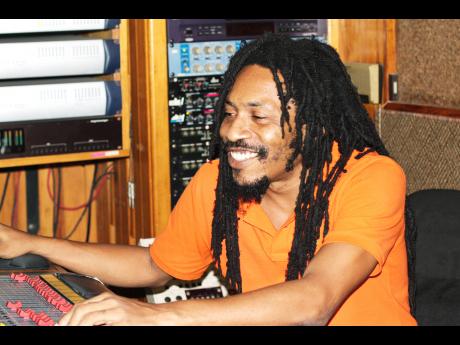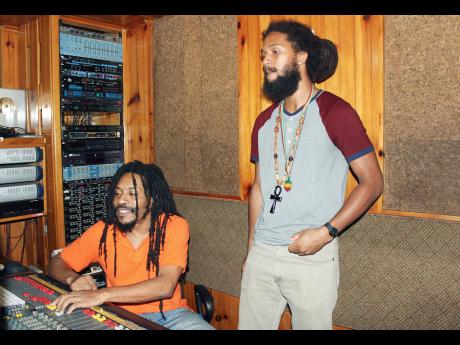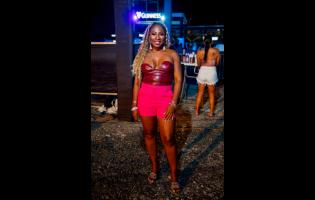Studio Vibes: Calibud not worried about technology changes
The residential setting of the Kingston 20 neighbourhood in which the Digital B Recording Studio is located, does not seem to complement the mellow sounds that music producer/audio engineer, Sheldon ‘Calibud’ Stewart is known for.
As Calibud leads the way inside the residence it is recognised that its original appearance has been maintained rather than completely transforming it into a more state-of-the-art recording studio.
In the right-hand corner, an Otari 24-Track Analog Tape Machine sits gently and then the SoundTrac Megas Board meets the eye.
When THE WEEKEND STAR questions its usage, Calibud is immediately stirred to speak.
He does his best to explain how the digital era has influenced the whole development of music from the process to the sound, touching the technicalities of bits as opposed to a variable recording.
But he says something incomprehensible then quickly paints a perfect picture of the differences between analog and digital recordings by comparing real life to reel life.
“Take for example the record reel in the movie theatre that continuously spins that produces the images for persons to see, creating a real life story for you; that is analog. Digital is not that easy or fascinating,” Calibud said.
It was surprising to hear that the 38-year-old analog aficionado was not always interested in music production.
Calibud believes that it will be a long time before analog fades away.
“I grew up in Waterhouse, lived there until age 13 which was around King Jammy. The first song I observed being recorded was a song by Cocoa Tea and Johnny P but at the time the excitement came from hearing a song buil’ and being able to talk about it before it release,” Calibud said.
“Now the feedback and actually hearing musicians / bands playing di same riddim yuh create, that for me is awesome and the highlight of my career thus far,” he added.
Calibud has acquired an executive role in the musical projects for Dre Tosh, grandson of the revolutionary Peter Tosh. He is the executive producer on the young Tosh’s recently released Coming in Hot single.
PRODUCTION STYLE
The short studio session exposed the production style of dancehall/reggae producer as well as a few singles recorded by Dre Tosh that he is finetuning.
The studio gets silent before finally giving a preview of two melodic rhythms built and mastered by Calibud.
“We want our reggae music to sound like back in the days, which is a warm sound. So instead of using the digital technology to fabricate electronic versions, I prefer to record live and patch it back into the system,” Calibud said.
The producer has been privileged to be a part of Grammy award-winning productions under the Digital B Record Label in which his stepfather has had greatest influence.
However, he has applied the teachings of Bobby Digital to grow into his own unique creative process.
“I have always tried to create things different but more significantly the creation of new music is a passion and while I can go to almost any seasoned dancehall or reggae recording artiste I rather to generate music that will be a part of my history,” Calibud said. “It has been tremendous to watch young artistes like QQ transition into more mature sound it is like planting a tree, watching it grow and looking back as it starts bearing fruits.”
Calibud is the producer of Betta Must Come and Never Know The Use Of Her by QQ. He has also worked with influential artistes such as Beenie Man, Warrior King and Sizzla.
Last year The Black Album, a compilation of songs celebrating black pride was released for Black History Month that featured a few of his productions.






































